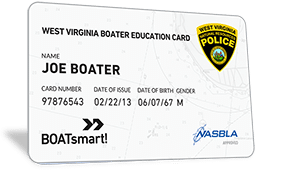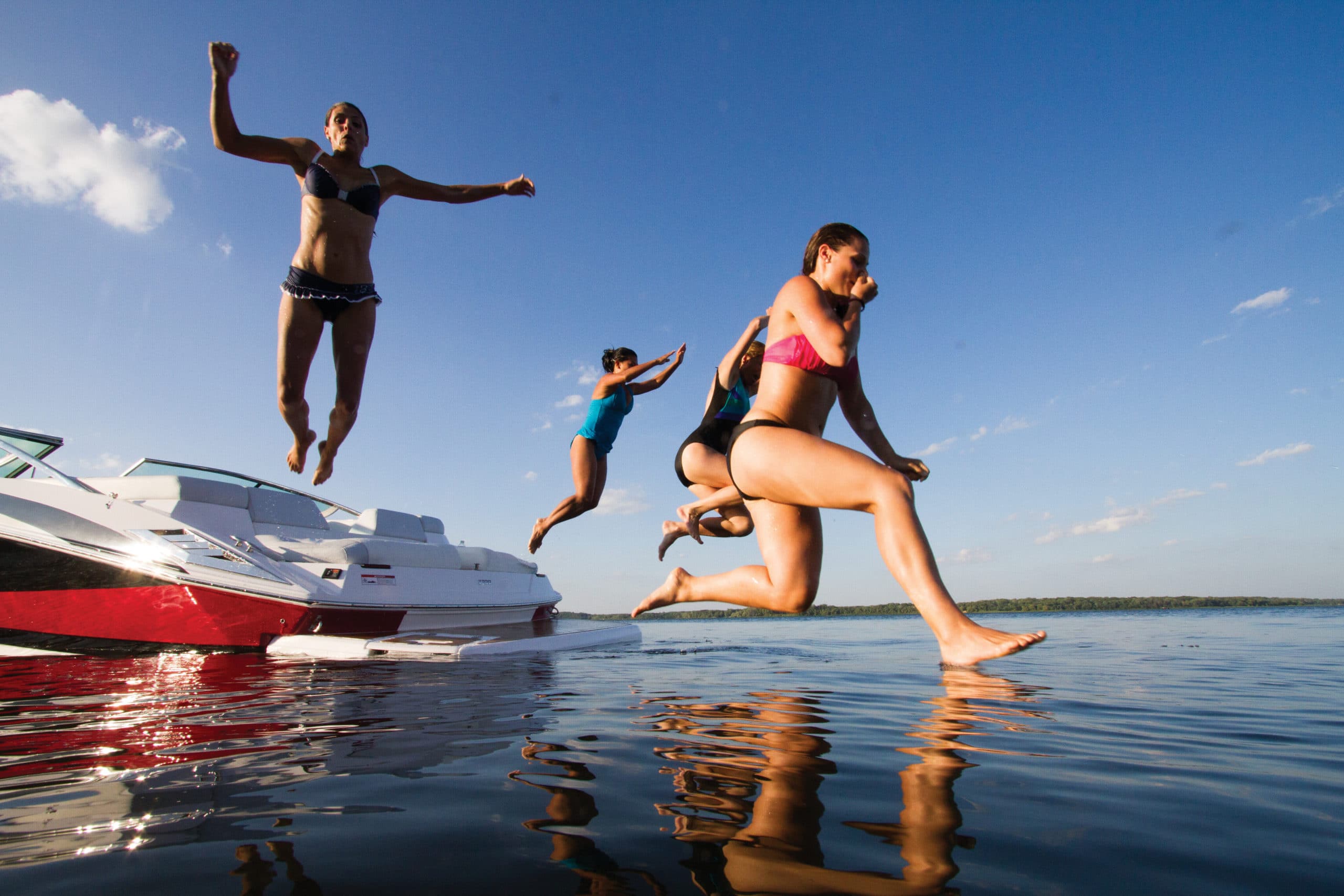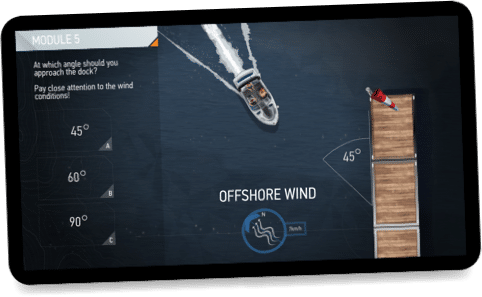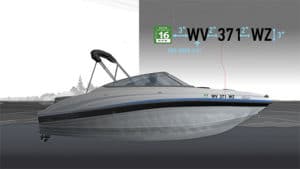
AGE REQUIREMENTS FOR WEST VIRGINIA BOATERS
In order to operate a motorized boat or personal watercraft (PWC), any person born after December 31st, 1986, must successfully complete a Boating Safety Education Course and carry the course completion certificate on board during operation.
Excellent!


Official West Virginia Boating Course
The West Virginia BOATsmart! Boating Safety Education Course is approved and accredited by the West Virginia Division of Natural Resources. With more than 3,000 Five Star Reviews, we’re proud to be recognized as an official West Virginia Boating Safety Education Course and the choice of boaters in West Virginia.


NASBLA & Coast Guard Approved
The BOATsmart! West Virginia Boating Safety Course is officially recognized by the United States Coast Guard as meeting the standards of the National Recreational Boating Safety Program. BOATsmart!’s online West Virginia Boating Safety Course is approved by the National Association of State Boating Law Administrators (NASBLA) as it meets and exceeds U.S. Boating Education Standards. NASBLA develops education standards for boating safety and represents boating law administrators in all 50 states and U.S. territories.

Watch, Listen & Learn
From anywhere, on any device at any time.
Our animated and narrated Boating Safety Course is perfect for all ages. Study from your Smartphone, Tablet or Desktop and switch between devices at any time. BOATsmart! automatically tracks your progress so you can study at your own pace.

WEST VIRGINIA BOATING LICENCE REQUIREMENTS
WHAT IS A WEST VIRGINIA BOATING SAFETY CERTIFICATE
A West Virginia Boating Safety Education Certificate proves that you’ve obtained the knowledge needed to safely operate a motorized boat on West Virginia’s. In West Virginia, any person born after December 31, 1986 must obtain their West Virginia Boating Safety Education Certificate to legally operate any motorized boat or PWC in West Virginia.
WHERE CAN I GET MY WEST VIRGINIA BOATING SAFETY EDUCATION CERTIFICATE?
You can get your West Virginia Boating Safety Education Certificate by completing the Official BOATsmart! Course online. Once you successfully complete the online study guide and final exam, you can print a temporary card immediately. BOATsmart! will mail your permanent card within 4 weeks.
HOW OLD DO I HAVE TO BE TO GET A BOATING SAFETY EDUCATION CERTIFICATE IN WEST VIRGINIA?
There is no minimum age to complete the West Virginia Boating Safety Education Course and obtain your Boating Education Safety Certificate.
AGE AND HORSEPOWER RESTRICTIONS
In addition to the Boating Safety Education requirement, boaters who are 12-14 years of age may operate a motorized boat or personal watercraft (PWC) so long as:
- A person 18 years of age or older is on board the boat.
- The boat is powered by a motor of 10hp or under.
HOW LONG DOES IT TAKE TO GET MY BOATING LICENSE?
It takes a minimum of 3 hours to get your West Virginia Boating Safety Education Certificate online. Once you’ve completed the online course and official test, you can print a temporary card and go boating right away. Your permanent card will be mailed to you by BOATsmart! within 4 weeks.
CAN I GET REFRESHER LESSONS AFTER TAKING THE WEST VIRGINIA BOATING COURSE?
Yes. Boaters in the state of West Virginia can keep up-to-date on the latest boating regulations with the free BOATsmart! Knowledge Base. Learn about boating equipment requirements, navigation and right-of-way regulations and restrictions that may apply onWest Virginia’s waterways to be sure that you’re safe and confident on the water.
DO I NEED A LICENSE TO RENT A BOAT IN WEST VIRGINIA?
Boat operators in West Virginia who were born after December 31, 1986 must obtain a Boating Safety Education Certificate to operate a motorized boat or PWC within the state of West Virginia.
Boating and alcohol in West Virginia
WEST VIRGINIA BOATING AND ALCOHOL LAWS
It is illegal in the state of West Virginia to operate any motorized boat or personal watercraft (PWC) on West Virginia waters while under the influence of alcohol, drugs or a combination thereof.
In West Virginia, a person is considered to be under the influence if:
- They have a Blood Alcohol Concentration (BAC) level of 0.08% or higher.
FINES AND PENALTIES
Upon a first conviction:
- You will be guilty of a misdemeanor.
- You will be imprisoned for no less than one day (24 hours) up to 6 months.
- You will be fined up to $500.
If convicted of BUI and you have passengers under 16 years of age on board, you shall be guilty of a misdemeanor.
Additionally, if the influence of alcohol or drugs is shown to be a contributing cause to the death of a passenger, the convicted operator is guilty of a felony and shall be imprisoned in the state correctional facility for up to 10 years and fined up to $3,000.
West Virginia Boating Age Requirements

12-14 YEARS OF AGE
In addition to the Boating Safety Education requirement, boaters who are 12-14 years of age may operate a motorized boat or personal watercraft (PWC) as long as:
- A person 18 years of age or older is on board the boat.
- The boat is powered by a motor of 10hp or under.

West Virginia's Boating Fines

Operating under the influence
Up to $3000

Failure to carry West Virginia Boating Safety Education Certificate
Up to $1000

Reckless or Negligent Boat Operation
Up to $1000

Life jacket violations
Up to $1000

Boat Registration Violations
Up to $1000
General West Virginia boating FAQs
WHO REGULATES BOATING LAWS IN WEST VIRGINIA?
The West Virginia Division of Natural Resources is responsible for regulating boating laws in the state of West Virginia.
Boating Emergencies:
Call 911 to report a boating emergency in West Virginia
WHO ENFORCES WEST VIRGINIA’S BOATING LAWS?
West Virginia’s boating laws are enforced by:
- The West Virginia Department of Natural Resources (DNR) Police Officers
- All other peace officers.
- The U.S. Coast Guard (on federal waterways).

How to register a boat in West Virginia
WEST VIRGINIA BOAT REGISTRATION
In order to legally operate a boat in West Virginia, you must obtain a Certificate of Number (registration card) and validation decals. The Certificate of Number must be on board and be available for inspection by a law enforcement officer during boat operation.
The Certificate of Number may be obtained by submitting an application and fee to the West Virginia Division of Motor Vehicles (DMV). Applications may be obtained from all Division of Motor Branch Offices, a licensed recreational vehicle dealer and the Division of Natural Resources.
Registration will expire on the last day of March in the year indicated on the registration card and the accompanying sticker. If, at the end of the registration period, ownership has remained unchanged, such owner shall renew their current registration, at which time a renewed registration and decal will be issued for an additional 3 year period.
THESE VESSELS DO NOT REQUIRE REGISTRATION IN WEST VIRGINIA
- A boat that is properly registered in another state and using West Virginia waters for 60 days or less.
- Boats from another country temporarily using West Virginia waters.
- Boats used only for racing.
- Non-motorized boats.
- Public boats of the United States, the state and any municipal boats and ships.
BOAT TITLING REQUIREMENTS
All motorized boats that were purchased by the current owner in West Virginia after July 1st, 1989, must have a title. This includes motorized sailboats.
DO I NEED BOAT INSURANCE IN WEST VIRGINIA?
Boats in West Virginia are not required to be insured, however it is recommended.

Boats in West Virginia are required to correctly display their registration number and validation stickers.
Registration numbers and stickers must be displayed as follows:
- Numbers must be applied as a decal, painted or permanently affixed to each side of the boat’s bow (boat owners are not permitted to display any other numbers in this area).
- The registration number must be in bold block letters that are at least 3 inches high and in a color that contrasts with the color of the boat.
- The numbers in the registration number must be separated from the letters by a hyphen or by an equivalent space.
- The number must be read from left to right.
- Validation decals must be affixed on both sides of the boat and be placed within 6 inches immediately following the assigned West Virginia number.
- These requirements also apply to personal watercraft (PWCs).
West Virginia lifejacket laws

WEST VIRGINIA’S JACKET LAWS
All boats in West Virginia, boat operators must carry at least one, Type I, II, or III life jacket or PFD for each person on board or being towed.

SHENANDOAH RIVER REGULATIONS
A person aboard a boat, raft, or tube is required to wear a Coast Guard-approved, Type I, II, III, or V life jacket at all times while underway on the Shenandoah River within the boundaries of the State of West Virginia from November 15 and to May 15.

BOATS MORE THAN 16 FT IN LENGTH
Boats that are 16 feet in length or greater must also carry at least one, Type IV (throwable) flotation device. Canoes and kayaks 16 feet in length and greater are exempt from this requirement.

PERSONAL WATERCRAFT
Operators of personal watercraft, passengers and anyone being towed behind a vessel must wear a U.S. Coast Guard-Approved Type I, II, III or V PFD. Inflatable lifejackets are excluded. Life jackets worn by a persons being towed are required to be rated for towing activities

CHILDREN 12 YEARS OF AGE AND UNDER
In West Virginia, passengers 12 years of age and under are required to wear a Coast Guard-approved, Type I, II or III life jacket while underway on the deck of any vessel.
Personal watercraft laws & regulations
SPEED LIMITS
It is illegal to:
- Operate or knowingly permit another person to operate a boat at a rate of speed greater than will permit that person to bring the boat to a stop within the assured clear distance ahead.
- Operate a motorized boat at greater than idling speed on established marked ‘No Wake’ zones on a government-owned reservoir or other water areas which have been approved by the Director.
- Operate at greater than ‘No Wake’ speed within 100 feet of an anchored boat, shoreline, dock, pier, swim float, marked swim area, swimmers, surfers, persons engaged in angling or human-powered craft.
- Follow too closely in excess of 10 miles per hour within 100 feet to the rear and 50 feet to the side of any other boat.
- Become airborne within 100 feet of a boat creating a wake.
RESTRICTED AREAS
It is illegal to:
- Anchor a boat in a position that obstructs a passageway ordinarily used by other boats.
- Anchor or tie a boat to any type of navigation aid or buoy.
- Operate a boat within 20 feet of the exterior boundary of a swimming area or area which is marked by signs or buoys as a restricted area.
- Operate within 20 feet of a person engaged in fishing activities without obtaining permission from that person.
Environmental Protection
NON-NATIVE AQUATIC SPECIES
American waterways have been under threat from foreign aquatic plants, fish and invertebrates. Aquatic Nuisance Species (ANS) are transferred from boats and boating equipment that originate from external waterways. Once introduced to a new waterway, the ANS will detach from the contaminated boat and spread like wildfire. ANS include: Milfoil, Zebra Mussels and Quagga Mussels.
Why are ANS such a serious threat?
- They have no natural predators in U.S. waters.
- Some ANS can actually survive out of water, making transfer easy.
- They reproduce quickly.
- They have harmful effects on the native wildlife, habitats and ecosystems.
For more information on Aquatic Nuisance Species, visit: www.protectyourwaters.net/impacts.php
Be sure to report new infestations of non-native aquatic species to the U.S. Fish and Wildlife Service at (209) 946-6400
HELP PREVENT THE SPREAD OF NON-NATIVE SPECIES
- Inspect all surfaces of your boat and remove aquatic plants or animals before leaving any body of water.
- Ensure you flush raw-water cooling systems and clean sea-strainers before moving your boat from one body of water to another.
- Empty and dry any buckets before leaving a body of water.
- Remove any plant fragments from bait wells, fishing gear, trailers, dive gear or props.
- Dispose of plant fragments and bait into a garbage receptacle on land.
- Avoid chopping vegetation with your boat’s propeller.
- Clean and dry all live-wells prior to transporting your boat.
- Drain all water from your motor and bilge and dry all areas. t.
- Thoroughly wash your boat, including the hull, before putting it into a new body of water.
- Refer to specific drying times.
For more information on how to stop the spread of AIS in West Virginia, visit https://www.wvdnr.gov/Fishing/Invasive_Species.shtm
Infestations of non-native species
Report new infestations of non-native aquatic species to the U.S. Fish and Wildlife Service at (209) 946-6400.
WEST VIRGINIA AIS REPORTING
Visit https://www.wvdnr.gov/Fishing/Invasive_Species.shtm to report sightings of AIS in West Virginia.
The Mountain State, Blue Waters, Good Times

West Virginia Boating Destinations
More than 20 of WVs lakes are over 100 acres in size. These lakes cover 20,118 acres of fishable and boatable waters – if that weren’t enough, there are also 2,000 miles of navigable streams, 41 impoundments, and 30 ponds managed by the Division of Natural Resources (DNR).
The Mountain State has no shortage of water activities, from boating Summersville lake to paddling the Potomac River, or white-water rafting the New River Gorge, you’ll be sure to find a boating activity that’s right up your alley. Boaters in WV can even cruise right through the capital (Charleston) on the Kanawha River, and float past their gold emblazoned Capitol building.
The West Virginia DNR provides a list of boating access sites and launch ramps, fishing areas and lakes on their website.

